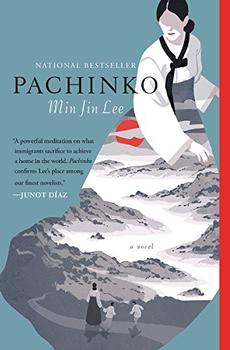Summary | Excerpt | Reading Guide | Reviews | Beyond the Book | Readalikes | Genres & Themes | Author Bio

Hoonie and Yangjin were married so quietly that if the family had not sent out mugwort cakes to the neighbors, they would have been accused of stinginess. Even the boarders were astonished when the bride appeared to serve the morning meal the day following the wedding.
When Yangjin became pregnant, she worried that her child would have Hoonie's deformities. Her first child was born with a cleft palate but had good legs. Hoonie and his parents were not upset when the midwife showed him to them. "Do you mind it?" Hoonie asked her, and she said no, because she did not. When Yangjin was alone with her firstborn, she traced her index finger around the infant's mouth and kissed it; she had never loved anyone as much as her baby. At seven weeks, he died of a fever. Her second baby had a perfect face and good legs, but he, too, died before his baek-il celebration from diarrhea and fever. Her sisters, still unmarried, blamed her weak milk flow and advised her to see a shaman.
Hoonie and his parents did not approve of the shaman, but she went without telling them when she was pregnant for the third time. Yet in the midst of her third pregnancy, she felt odd, and Yangjin resigned herself to the possibility that this one, too, may die. She lost her third to smallpox.
Her mother-in-law went to the herbalist and brewed her healing teas. Yangjin drank every brown drop in the cup and apologized for the great expense. After each birth, Hoonie went to the market to buy his wife choice seaweed for soup to heal her womb; after each death, he brought her sweet rice cakes still warm from the market and gave them to her: "You have to eat. You must get your strength."
Three years after the marriage, Hoonie's father died, then months after, his wife followed. Yangjin's in-laws had never denied her meals or clothing. No one had hit her or criticized her even as she failed to give them a surviving heir.
At last, Yangjin gave birth to Sunja, her fourth child and the only girl, and the child thrived; after she turned three, the parents were able to sleep through the night without checking the pallet repeatedly to see if the small form lying beside them was still breathing. Hoonie made his daughter dollies out of corn husks and forsook his tobacco to buy her sweets; the three ate each meal together even though the lodgers wanted Hoonie to eat with them. He loved his child the way his parents had loved him, but he found that he could not deny her anything. Sunja was a normal-looking girl with a quick laugh and bright, but to her father, she was a beauty, and he marveled at her perfection. Few fathers in the world treasured their daughters as much as Hoonie, who seemed to live to make his child smile.
In the winter when Sunja was thirteen years old, Hoonie died quietly from tuberculosis. At his burial, Yangjin and her daughter were inconsolable. The next morning, the young widow rose from her pallet and returned to work.
Excerpted from Pachinko by Min Jin Lee. Copyright © 2017 by Min Jin Lee. Excerpted by permission of Grand Central Publishing. All rights reserved. No part of this excerpt may be reproduced or reprinted without permission in writing from the publisher.
Your guide toexceptional books
BookBrowse seeks out and recommends the best in contemporary fiction and nonfiction—books that not only engage and entertain but also deepen our understanding of ourselves and the world around us.